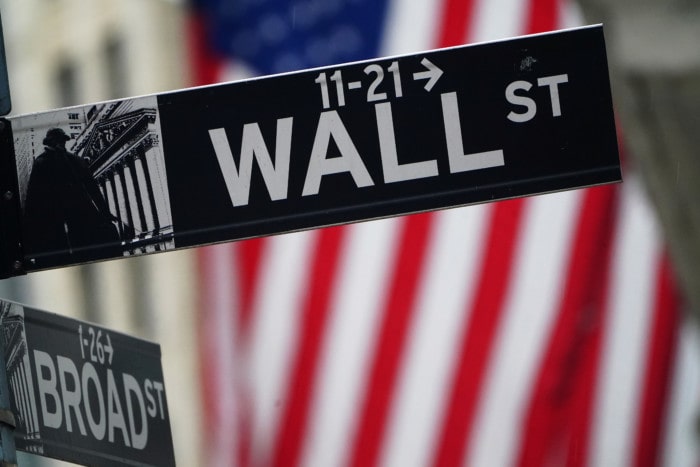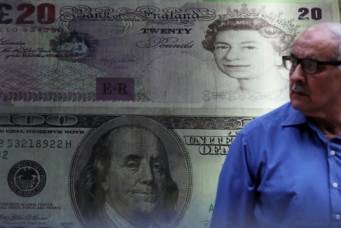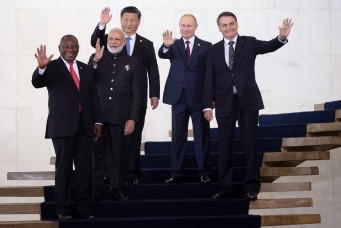Receding Multilateralism and the Role of the Dollar in a COVID-19 World
The shock of COVID-19 has plunged the world into an economic crisis, demonstrated the fragility of economic relations and supply chains, and led to a reevaluation of several concepts taken for granted.

U.S. President Donald Trump’s isolationism has had significant ramifications on the general economic climate and the functioning of institutions of global governance.
Cairo Review Assistant Editor Omar Auf spoke with economist Adel Beshai at the American University in Cairo, about his local and global outlook as the U.S. presidential elections approach and what Egypt can expect in its future.
Beshai was a key player in the founding of the International Fund for Agricultural Development (IFAD) in his role as special consultant to the secretary-general of the 1974 World Food Conference. He was tasked with negotiating with the Organization of Petroleum Exporting Countries and Development Assistance Committee countries for the creation of IFAD, who were the contributors to the majority of the fund.
The following are excerpts from that interview.
Cairo Review: How will economic relations between the United States and Egypt and the larger Middle East and North Africa (MENA) region differ if U.S. President Donald Trump or former Vice President Joe Biden win the upcoming election?
Adel Beshai: Whether Democrats or Republicans, they will deal with the following: Egypt will remain important in the eyes of America. When I say “America”, there is the President, there is the Pentagon, and there is the State Department, and this cannot be ignored. Egypt will always be recognized as the power in the area. Strategically, it’s very important. So, in that respect, in a way the relationship won’t be that much different.
If Biden comes, he will revive the agreement with the World Trade Organization (WTO) and things like that. If Trump continues—which is a possibility—even Trump may be revising himself a little bit when it comes to dealing with international organizations.
I think that when we look at the Trump administration in the last four years vis-a-vis Egypt, both Egyptians were happy with the United States and the United States was supportive of Egypt, and life went very [well]. In that respect I can say all went well.
CR: Seeing as Trump has blocked the appointment of judges in the WTO’s appellate body, and is now threatening to withdraw from the organization completely, do you think he will go through with it and withdraw, or is he already starting to revise his attitudes?
AB: With the WTO, my guess is that—because America is interested, and will be more interested if the WTO behaves well—[Trump] won’t withdraw completely from it, but he will work through the structure so that when it comes to buying from abroad and when it comes to supply chains, [Trump] will give it [WTO proposals] to his people to study very well before he agrees.
CR: Will COVID-19 force the United States, along with the rest of the leading economies, to seek a higher level of independence and self-sufficiency, or will it force the global economy in general to look to strengthen and create more agile supply chains?
AB: For years and years, the god was globalization and America championed it, and suddenly America, vis-a-vis China, became dependent.
When there is globalization, and there are supply chains, this is what we call in international economics “intra-industry trade”. Prices go down because the mobile which you’re holding in your hand now is made in seventeen countries. Boeing is made in twelve or fourteen countries. This makes the whole thing cheaper. The world in the past thirty to forty years is intra-industry trading, in contradistinction to inter-industry trade. In the past, England sold you a Morris car and you sold them cotton. Now, it is different. If you’re selling parts and components, the end result is that things become cheaper. This no one can disagree about; it’s a mathematical fact.
At the same time, there can be political reasons and there can be economic reasons, which, for a country like America more than others, will make them deglobalized to a certain extent. Be that as it may, under any circumstances, supply chains from China will still continue, but the United States will try to reduce them. America will put tariffs and taxes, and America can produce the parts it wants. It would be a fraction of what it has been getting from China, but the result is that prices will rise. Now, rising prices are not a wonderful situation for America. It means the consumer in America will pay more and that their ability to export things will be reduced, so they may become not a wonderful competitor in the world market. With respect to whether supply chains will continue or not, they will continue. Some of them will be blocked, but you pay a price for it.
Already, memories of the 1970s of the World Food Conference now spring. I think any country in the world, including Egypt, should begin to worship the term we invented in 1974, which is “food security”. Countries that have grain will be very careful before they export. They will want to make sure they have enough because of a very simple reason: food cannot wait. You buying a car can wait. But food cannot wait. And that’s why, politically, countries can raise the price of oil and [use] it as a political weapon, but they would not use food as a weapon. Because food, for the third time, cannot wait. So one has to pay attention to the agricultural sector. One of the things that saved Egypt, which functioned well during the Corona crisis, is the agricultural sector, which is 28 percent of the gross domestic product, but in reality more because of the people who work on it and depend on it: perhaps 45 percent. And none of them stayed at home. They all worked. This kept the pot boiling. This was one of the main things which allowed Egypt to sail well economically during Corona.
CR: What place do you see for isolationist sentiments and trade wars in the current economic climate?
AB: As I mentioned, supply chains will have to continue. But at the same time, when it comes to agriculture, countries want to produce more food.
America doesn’t want to be dependent on China. which brings us to a very, very crucial issue which has a lot to do with your focus on global affairs. I feel that we are now beginning to remind me of the period after the Second World War. How?
After the Second World War, slowly, England began to disappear. Until then, England had three quarters of the world. Sterling was the god. And I told you earlier, people’s memories are short. So what happened after the Second World War, from 1945 to 1956?
England, which was the colossal power, began to diminish. When people talk about the devaluation of the pound sterling, they talk about the 1967 devaluation, when the pound sterling was $2.8 and it was devalued to become $2.4. However, there is a devaluation which all my professors at Stanford and at Oxford didn’t mention. There was a devaluation of the pound in 1949. This is the beginning of England’s fall. The pound sterling in 1949 was equal to $4, and it was devalued to $2.8. Secondly, after the Second World War, America had for for the most important part in her economic history, a super balance of payment surplus. All these years since you were born, America had a payment deficit. But back then it had a huge balance of payment surplus. And thousands of articles were written in the economic journals called “The Dollar Problem”; “The Long Run Dollar Problem”; “The Dollar Shortage”; “The Dollar Glut”. What was the dollar glut for America? America was exporting in a period of super industrialization; America was selling to the whole world. So her balance of payment was in surplus, and the dollar was becoming very powerful.
So why am I saying all this? I am saying we live in a world of cycles. England was also once upon a time the dominant power, and then the United States began to be the economic power. And as she became the economic power, she began to be the political power more and more; so much so that in 1956, in our war, when there was the tripartite aggression on Egypt, America told England to get out of Suez. Who would have told England to do that in the past?
Now I’m seeing something similar: this time not between England and the United States, but between the United States and China. What is happening in China, in terms of production, is fantastic. There is no question that China will become a very important economic power. This is happening at a time when, in America, economic policy has not been wonderful lately. Add to that that the pandemic piled onto the budget deficit of America and America was giving federal relief. The deficit is increasing over time and Americans are saving less and less. Plus, in America, there is the aging stock of capital. The international situation is not wonderful.
Of course, you can’t ignore America and you can’t ignore the dollar. 62 percent of world transactions have been dealing with the dollar. But, this will not continue. Trump’s administration began to do something which is not found in any introductory economic textbook. The head of the Federal Reserve Bank began to print money and buy shares of companies which were almost nonexistent because of Corona. So, the amount of debt skyrocketed. Frightening, you know. And you had a very interesting situation: the private sector became in essence a public sector, because you had a situation where the Federal Reserve was printing money to buy shares of companies which were hardly working. You were not competitive in the world market. The capitalist country became—don’t be shocked—China, because she was functioning normally. She didn’t print and print to buy shares. I am mentioning this point because, globally, people talk about the world economic order. Why not talk about the world economic disorder? And out of the disorder later on an order will come.
So, there’s a world economic disorder happening now. There is a change happening. So the question that should now arise in your mind is that of history. In the 1960s, Giscard d’Estaing, a former French president, said that America took advantage of its position as the world’s dominant reserve currency, and the rest of the world supported it. The dollar became the de facto international currency.
Because of it, Americans could live better and spend more, because any other country has its currency backed by what it produces, but the dollar shines of its own light. In the end currencies are relative prices; the exchange rate is the price of my country’s currency vis-a-vis yours. So my prediction is that eventually the dollar will cease to be the world’s de facto currency. What will come in place of it will take some time. I don’t know, but you have to look at some Asian countries like Vietnam, and China, of course.
In addition to that, we have gold and cryptocurrencies, which are beginning to be alternatives to that once invincible dollar. So, saying all this, and telling you the history of it, we may say that we are in the beginning of a major change.
CR: What is your view for Egypt’s economic development in the future? Do you think Egypt wants to become an industrial powerhouse, a service-based economy, or something else? What, then, is the role of the agricultural sector in Egypt?
AB: Egypt has a very huge horizon, and Egypt needs to gather its people of varying backgrounds and listen to new ideas. I am a man of agriculture. I know about agriculture. I’ll just give you one example. Egypt has done very well in agricultural exports lately, and during Corona she did very well. Yet, the scope for Egypt is unknown. I understood this once I got a packet of asparagus seeds from Italy. I planted them and they grew beautifully. And—it is one thing I can tell you from forty years of experience—it grows with zero chemical fertilizer and zero pesticides, which means it more than meets the conditions that the European Union put, as they allow you a certain amount of chemical fertilizer and a certain amount of certain pesticides. And asparagus is the most expensive vegetable on earth! This is in agriculture. In industry Egypt has been a bit slow in the last few years. You have to have an industrial policy and an agricultural policy. On the television people say: I, as a minister, my agricultural policy is this; and you, as a minister of industry, your industrial policy is that. I want to hear that.
My advice if I were sitting with the Egyptian president now would be: “Mr. President. You are very active. You talk with everyone. I’m sure you only sleep four or five hours a day. I can tell from the amount of work you do. But meet with all your ministers, and tell them: ‘You people in industry, come and tell me what you want. You in agriculture, come and tell me what you want. You want advice? Okay. Minister of Agriculture, Cairo University, AUC, bring them professors to tell them more about agriculture.’ Mix people together. And you can know that Egyptians are fantastic if you look at the informal sector.”
The informal sector is huge in Egypt—70 or 80 percent [of the Egyptian economy]—and most of it is doing wonders. We are interested in economic statements on productivity and measured productivity. Fine: you have seen this man who has this thing on his head on which he’s carrying a thousand loaves of bread, riding a bicycle. And the bicycle doesn’t have breaks; he breaks with his legs. Not only would he stop at that; now he’s talking on the phone, and the bread still doesn’t fall.
I studied physics a lot in the past, and I cannot explain it. But, you’re talking about productivity? Measure his productivity. Go and look at the speed of the man who’s selling beans in the morning and see how many people he sells to.
There is a big part of the informal sector where, if you try to play with it, you lose it. Secondly, there is also a big part of it which you can help by giving it some sort of loans, at a fraction of the market price, and they will be wonderful. So, there is a part you have to leave alone, there is a part you can help, and there is a part which will grow to become, you know, sort of middle level [enterprise, which can be integrated into the formal economy].
Good you asked me this question. My final wasiyya, my final legacy I would like to leave any government in Egypt, is something that I studied. It was published in 1966, and you, as a government, should hang it everywhere. Write the following down: predictability and consistency of government policy. Predictability and consistency of government policy; not you give me a policy and then, after six months, there is a new one. You will not grow [this way]. Predictability and consistency. Policy must be predictable. It must be consistent. What do I mean by consistent? I watch the price of fertilizer. There’s the gamiyya, the cooperative, but very few people buy from the gamiyya; the rest buy from the market at three times the price. So, are you consistent? Are you facilitating access to inputs needed at the right prices?




